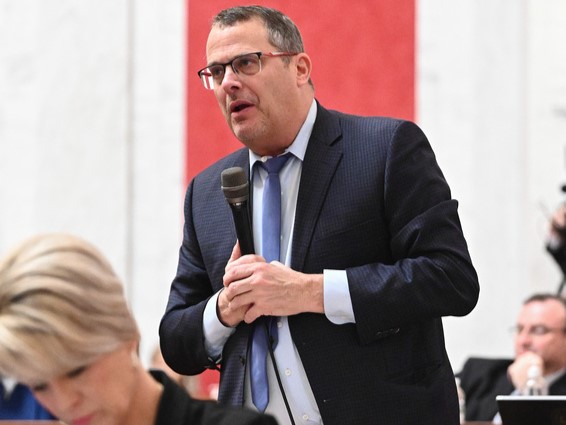As primary season kicks into high gear, Republicans are engaged in nomination fights that are pulling the party to the right, leaving some leaders worried their candidates will be out of a step with the broader electorate in November.
Primaries in four states on Tuesday, all in places Donald Trump carried in 2016, showcase races in which GOP candidates are jockeying to be seen as the most conservative, the most anti-Washington and the most loyal to the president. It’s evidence of the onetime outsider’s deepening imprint on the Republican Party he commandeered less than two year ago.
In Indiana, Republicans will choose between three Senate candidates who have spent much of the race praising the Trump and bashing each other. In West Virginia, a former federal convict and coal baron has taken aim at Senate Majority Leader Mitch McConnell, R-Ky., with racially charged accusations of corruption.
In Ohio, Republicans are certain to nominate someone more conservative than outgoing GOP Gov. John Kasich, a 2016 presidential candidate, moderate and frequent Trump critic. Even Kasich’s former running mate, Lt. Gov. Mary Taylor, has pledged to unwind some of Kasich’s centrist policies, including the expansion of the Medicaid government insurance program following Democrats’ 2010 health insurance overhaul.
With Trump’s job approval hanging around 40 percent and the GOP-run Congress less than half that, the abandonment of the middle has some Republicans raising alarms.
“The far left and the far right always think they are going to dominate these elections,” said John Weaver, a Trump critic and top strategist to Kasich, who has been become a near-pariah in the primary to succeed him.
“You may think it’s wise in a primary to handcuff yourself to the president,” Weaver said. “But when the ship goes down, you may not be able to get the cuffs off.”
North Carolina Republicans will weigh in on the fate of Republican Rep. Robert Pittenger, facing a primary challenger who almost upset him two years ago. Pittenger features Trump prominently in his campaign. Challenger Mark Harris, a prominent Charlotte pastor, has tried to turn the table, saying Pittenger is a creature of Washington who refuses to help Trump “drain that swamp.”
Tough primaries certainly don’t have to be disastrous. They often gin up voter attention and engagement, and can signal strong turnout in the general election.
Dallas Woodhouse, who runs the North Carolina Republican Party, said candidates benefit because they must “make their arguments and voters become more aware of the election.”
Trump and his Democratic opponent Hillary Clinton each survived internal party battles in 2016. Clinton won the national popular vote that year, but in the states that mattered most — Ohio and North Carolina, among them — wary Republicans gravitated back to Trump while Clinton struggled to hit the usual Democratic base targets.
Few national Republicans look at West Virginia and see helpful enthusiasm.
Former coal executive Don Blankenship has accused McConnell of creating jobs for “China people” and charges that the senator’s “China family” has given him millions of dollars. McConnell’s wife is Trump’s transportation secretary, Elaine Chao, who was born in Taiwan.
Indiana Senate candidates are trying to appeal to Trump voters by adopting the president’s harsh immigration rhetoric and penchant for personal insults. The candidates have even channeled Trump by assigning derisive nicknames to one another: “Lyin'” Todd Rokita, Luke “Missing” Messer and “Tax Hike” Mike Braun.
In several of the Tuesday primaries, Democrats are watching with delight, and having less trouble aligning behind nominees. The chief beneficiaries would be Democratic Sens. Joe Manchin of West Virginia and Joe Donnelly of Indiana, both sitting on healthy campaign accounts after avoiding their own primary fights.
The leading Democrat for the North Carolina seat, Marine veteran Dan McCready, has raised almost $2 million, slightly more than Harris and Pittenger combined, in a district Trump won by about 12 percentage points. “He will absolutely make this competitive,” Harris said.
In the Ohio governor’s race, liberal former Rep. Dennis Kucinich and former state Attorney General Richard Cordray have managed to avoid open warfare. Cordray, who also led the federal consumer watchdog agency launched under President Barack Obama, is the favorite.
Republicans watched their state party, led by pro-Trump leadership that replaced Kasich allies after the 2016 elections, endorse state Attorney General Mike Dewine, while Taylor has effectively shunned an earlier endorsement from Kasich.
“If Ohio Republicans are divided into Trump Republicans and Kasich Republicans, the Trump Republicans have won,” said the state Democratic chairman, David Pepper. “That helps us.”
Gallup measures Trump with an 89 percent job approval rating among Republicans nationally, but 35 percent among independents and 42 percent overall. Historically, presidents below 50 percent watch their party suffer steep losses in midterm elections.
Democrats must flip about two dozen Republican-held seats to reclaim a House majority, and they must do it with Republican-run legislatures having drawn many districts to the GOP’s advantage. In North Carolina, Harris said the makeup of the district, which stretches from Republican areas of metro Charlotte east through small towns and rural counties, makes his pro-Trump, anti-establishment message a primary and November winner.
Senate Democrats are just two seats shy of a majority, but must defend 26 incumbents, 10 in states where Trump won, including Ohio, Indiana and West Virginia. Republicans are defending nine seats, just one in a state Trump lost.
